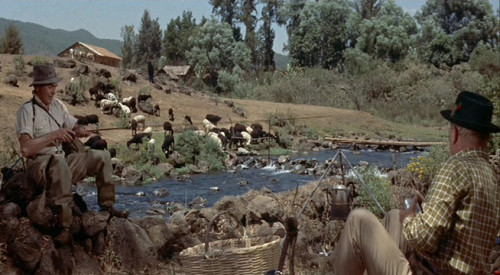When Jake Barnes and Bill Gorton stop for lunch while trout fishing on the Irrazy River, it looks like a picnic.
Whether it’s a lunch or a picnic doesn’t matter because it’s when Hemingway chooses to reveal Jake Barnes’ spiritual disquietude and Bill Gorton’s irreverence. Engaging in free association, the talk leads Bill to mock Christian Fundamentalism and the Scopes trial and William Jennings Bryan’s testimony about when God created the universe. The chatter means to be sardonic, and when talk segues to the Catholic Mass, the tone darkens. Bill questions what should be eaten first—the roast chicken or the hard-boiled eggs. Jake’s reply is jokey:
“First the chicken; then the egg.” “Wonder what day God created the chicken?’“Oh, said Bill, sucking the drumstick, “how should we know? We should not question. Our stay on earth is not for long. Let us rejoice and believe and give thanks.”“Eat an egg.” Because it doesn’t matter to them, Jake and Bill eat the chicken, along with many slugs of the icy red wine. It’s when Bill remembers that Jake is Catholic that the tone darkens. Seriously Bill asks:“Listen Jake,” he said, “are you really a Catholic?”
“Technically.”
“What does that mean?”
“I don’t know.”
Hemingway abruptly ends the conversation. He’s established an intimate glimpse of Jake’s lapsed Catholicism, unhappy love affair with Brett Ashley, and his wobbly sense of self. Though Jake and Bill enjoy several more days of fishing, further conversations of this sort are unnecessary.
*Daryl Zanuck, the producer, Henry King, the director, and Peter Viertel, the scriptwriter, knew they played false with Hemingway’s dialog for The Sun Also Rises to satisfy the moral injunctions of the Motion Picture Production Code. Revisions to Hemingway’s text are especially evident in the trout fishing sequence, which smooths over Jake Barnes’ lost faith, joking reference to the Catholic Mass.
Featured Image: Gorton (Eddie Albert) makes coffee while Barnes (Tyrone Power) plays with his hat. Henry King. The Sun Also Rises (1957)
See Ernest Hemingway. The Sun Also Rises. New York: Charles Scribner’s Sons, 1926; Carlos Baker. Hemingway: The Writer as Artist. Princeton: Princeton University Press, 1972; Henry King. The Sun Also Rises (1957). Screenplay by Pieter Viertel based on Ernest Hemingway’s novel (1926); Peter Viertel. Dangerous Friends. New York: Doubleday, 1992.

